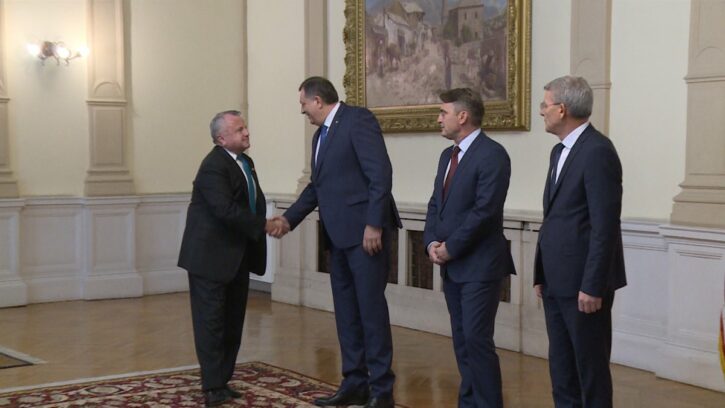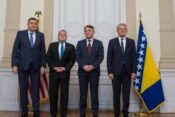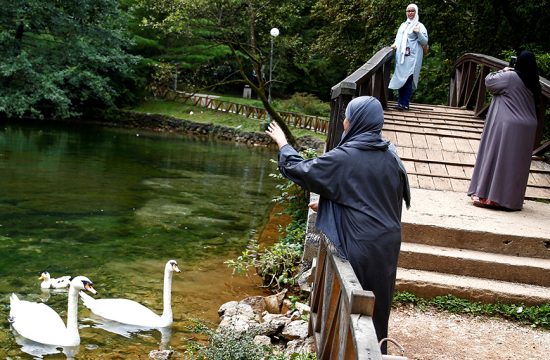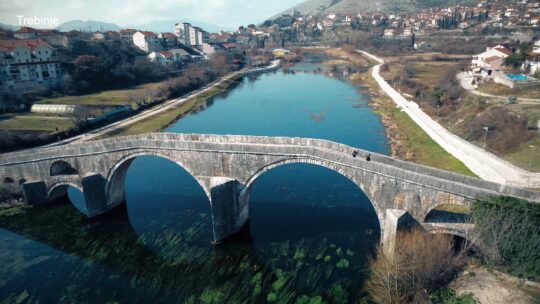
Although he is now one of Bosnia’s three presidents, US sanctions against Milorad Dodik will not be lifted as Washington remains committed to Bosnia’s sovereignty and to the peace agreement, Deputy US State Secretary John Sullivan said at a press conference in Sarajevo on Monday.
Dodik, the Bosnian Serb leader who prior to taking over a seat in the Presidency ran the Serb-dominated semi-autonomous region of Republika Srpska (RS), has been advocating for its secession and remains blacklisted by the US since 2017 for obstructing the 1995 Dayton Peace Agreement that ended the Bosnian war.
The US has not changed its position regarding the sanctions against Dodik and Sullivan stressed that he greeted him because he respects the Presidency as an institution and that he “dealt with Mr Dodik on that basis.”
“The US Government will always react strongly to any threats to the stability of Bosnia and Herzegovina,” he added.
“We are committed to this country's sovereignty and territorial integrity, in line with the 1995 Dayton Agreement,” Sullivan said. “Working together, the US, Europe and other partners will deal firmly with those who seek to undermine those principles in any way, and that should include for the worst offenders coordinated sanctions on their ability to travel and on individually held assets.”
He noted that his country will also “counter external forces that actively seek to make Bosnia and Herzegovina evermore vulnerable with internal instability.”
Sullivan met with Bosnia’s three Presidency members, Bosniak Sefik Dzaferovic, Bosnian Serb Milorad Dodik and Bosnian Croat Zeljko Komsic.
He said that he “expressed the US government's frustration with the tendency of some in public life to utilise divisive and inflammatory rhetoric.”
“I urged a more cooperative spirit in moving this country forward together,” he said.
Sullivan encouraged all Bosnian citizens “to give priority not to protecting ethnic privileges that keep them segregated from each other, but to promote policies that will give them jobs, greater opportunity, an integrated education system and the prosperity they want for their children and grandchildren.”
“We sense that ethnic divisions are created by political leaders to remain in power,” he said, adding that “if there is one thing that should unite all the citizens” in the country, it should be the “desire to end the rampant corruption that saps this country’s wealth prompting its young peoples to seek opportunities abroad instead of investing at home.”
He called upon political leaders in Bosnia to “step up and show courage and the responsibility to make hard decisions, embrace compromise and move forward,” insisting that Bosnia’s government should be formed as soon as possible following the October General Election.
Once it is formed, the Government should promote policies that will provide more opportunities to citizens to succeed and prosper and should undertake the necessary reforms to make integration with NATO and the EU a reality, the Deputy US State Secretary said.
Bosnia’s inability to implement reforms to make the government more functional, efficient and accountable “has held the country back,” he said. This is also true regarding “unwillingness to correct glaring shortcomings,” he said, giving the example of the “discriminatory ethnic criteria” that prevent those who are not members of the three majority ethnic groups in the country from serving certain offices.
“Bosnia and Herzegovina’s neighbours are making progress and no one wants to see this country further behind,” he said.
“Efforts to undermine state institutions and calls for secession or a third entity violate the spirit and letter of Dayton and endanger stability of Bosnia and Herzegovina and the entire region,” Sullivan said, referring to calls by Bosnian Croat officials for the establishment of a separate Croat entity.
He also said that the US “enthusiastically supports” the decision of Bosnia’s Government to pursue NATO membership.
Dodik has earlier said he will not support Bosnia’s NATO accession.





